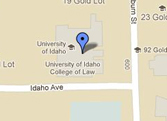College of Law
Moscow

uilaw@uidaho.edu
Administration Office: 208-885-2255
Dean’s Office: 208-885-4977
fax: 208-885-5709
Menard 101
711 S. Rayburn Drive
Mailing Address:
College of Law
University of Idaho
875 Perimeter Drive MS 2321
Moscow, ID 83844-2321
Boise
First Monday - November 1, 2010
In this issue:
- State Designates Historic Ada County Courthouse as Future Home of the Idaho Law Learning Center
- Faculty Redesigns First-Year Curriculum
- Student Advocates Excel in 22nd Annual McNichols Competition
State Designates Historic Ada County Courthouse as Future Home of the Idaho Law Learning Center
As readers of “First Monday” know, the University of Idaho is collaborating with the Idaho Supreme Court to develop an Idaho Law Learning Center in Boise. The Center will house an enhanced Idaho State Law Library as well as Boise programs of the College of Law, while also providing a distinctive venue for continuing judicial education and law-related civic education for the public. The planned site of the Center is the Capitol Annex (old Ada County Courthouse), an historic, state-owned building strategically located on the Capitol Mall between the Statehouse and the Supreme Court, and directly across the street from the Idaho State Bar/Law Foundation.
On November 1, 2010, Teresa Luna, Interim Director of the Idaho Department of Administration, issued a letter to Patti Tobias, Administrative Director of the Courts, Idaho Supreme Court, with the following statement: “In an effort to preserve and utilize the historic buildings on the Capitol Mall, and in accordance with I.C. 67-5708, the Department of Administration has designated the Capitol Annex as the future home of the Idaho Law Learning Center. We look forward to working with you during the course of this project.”
The Department of Administration, Division of Public Works, has placed signs on the Capitol Annex grounds identifying the building as the Center’s future home.
Faculty Redesigns First-Year Curriculum
For more than two years, the College of Law Curriculum Committee has been working on a plan to reform and modernize the first-year curriculum. The Committee has considered whether, and how, the College might revise its first-year offerings in light of the Carnegie Foundation Report, Educating Lawyers for the Profession of Law (2007), and the Clinical Legal Education Association (CLEA)-sponsored report, Best Practices for Legal Education (also 2007). Both the Carnegie Foundation and CLEA recommended that law schools provide greater training in skills needed to practice law upon graduation, e.g., greater emphasis on writing (both persuasive writing, such as memoranda and briefs, and document drafting), negotiation and mediation skills, client counseling, and fact collection. The Committee led extensive faculty-wide discussions focusing primarily on the types of “skills” that should be included in the first year, with further discussion about what material in the first year would be shortened or shifted elsewhere in the curriculum in order to provide time for such skills training.
The Committee reached a consensus that the existing first-year curriculum, which has followed a traditional pattern emphasizing common law case reading and analysis, should be updated to include greater exposure to public law as well as to statutory and regulatory reading and application. Proposals for reduction of the main first-year courses were solicited and received from the faculty teaching those courses. Ultimately the Committee proposed a revision to the first-year curriculum that entailed reducing the credit hours allocated to Property, Contracts, and Torts, but not reducing Civil Procedure (which also encompasses an introduction to law and procedure). A key point of the Committee’s proposal was the “semesterization” of selected first-year courses. The Committee also developed a proposal to add other courses to the first-year curriculum (see below); to make necessary upper division courses in light of reduced first-year credit hours; and to deliver background material to first-year students on government structure/federalism/legal history (so-called “Civics 101” topics) to enhance their familiarity with the contextual background of the doctrinal courses.
On October 27, 2010, after numerous open meetings on the Committee’s proposals, the full faculty voted unanimously:
- To reduce first-year Contracts and Property from 6 credits over two semesters, to 4 credits in a single semester.
- To reduce Torts from 5 credits over two semesters, to 4 credits in a single semester.
- To add a new 3-credit course in the first year, addressing statutory and regulatory reading, construction and application
- To move Constitutional Law I from the upper division to the first year, where it will be a 4-credit course
- To retain Civil Procedure (Introduction to Law and Procedure) at 6 credits, along with Legal Research and Writing at 5 credits, in the first-year curriculum.
- To add Real Estate Transactions (conveyancing and financing of standard real estate transactions) and Advanced Torts (e.g., product liability and business torts) to the upper-division curriculum.
- To develop a required summer reading list on “Civics 101” topics for incoming students, while continuing the Introduction to Law components of Civil Procedure.
- To establish an ongoing, systematic and regular process for assessing the overall efficacy of the entire law school curriculum.
Further information about the curricular modernization effort may be obtained from the Committee co-chairs: Professor Ben Beard (beardb@uidaho.edu) and Professor Richard Seamon (richard@uidaho.edu).
Student Advocates Excel in 22nd Annual McNichols Competition
At the University of Idaho, appellate advocacy is an essential part of the first-year Legal Research and Writing Course. Second-year students then take their skills to a higher level through the Hon. Raymond C. McNichols Intramural Moot Court Competition. The competition is named in honor of the late Ray McNichols, Judge of the United States District Court for the District of Idaho. Judge McNichols was one this state’s most highly respected jurists as well as one of the College’s closest friends and most distinguished alumni.
“Doing McNichols,” as the law students say, is a test of both talent and commitment. Each student is required to write a full appellate brief that is carefully evaluated and ranked. Each student participates in one or more rounds of oral arguments, ultimately yielding a set of finalists whose arguments are among the highlights of the College’s academic year. The early rounds of oral argument are judged by faculty as well as by other members of the law school community. In the final round, judges and justices from the state and federal courts of Idaho, and from neighboring jurisdictions, gather to engage the best and brightest students in an unforgettable rite of professional passage.
On October 30, 2010, under the auspices of the College’s Board of Student Advocates (BSA), the College conducted its 22nd annual McNichols Competition. The winner of the final oral argument was Andrew Barton, who came to the College of Law with a baccalaureate degree from Brigham Young University-Idaho. Joining him in the final round was eventual runner-up Lauren Vane, a graduate of Boston University. Bryce Downer (The Ohio State University) earned honors for best overall advocacy throughout the competition, and Alison Hunter (University of Virginia) received the best brief award. Ms Hunter and Rainier Elias (University of Idaho) won recognition as oral argument semifinalists. The competition was overseen by students Matthew VanZeipel, Brian Dickson, and Andrew Jorgensen on behalf of the BSA, with advice and guidance from law faculty member Laurie O’Neal.
The final round was judged by distinguished members of the bench and bar: Hon. N. Randy Smith, Judge of the United States Court of Appeals for the Ninth Circuit; Hon. Mary Schroeder, Judge (and past Chief Judge) of the United States Court of Appeals for the Ninth Circuit; Hon. Edward Shea, Judge of the United States District Court for the Eastern District of Washington; Hon. Renae Hoff, District Judge of the Third Judicial District, State of Idaho; and Michael E. McNichols (UI Law ’63), partner in the Lewiston law firm of Clements, Brown & McNichols. Mr. McNichols, son of the competition’s namesake, is a long-time supporter of the competition and one of the principal donors of funds for student awards.


